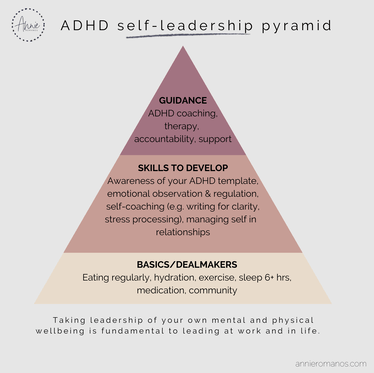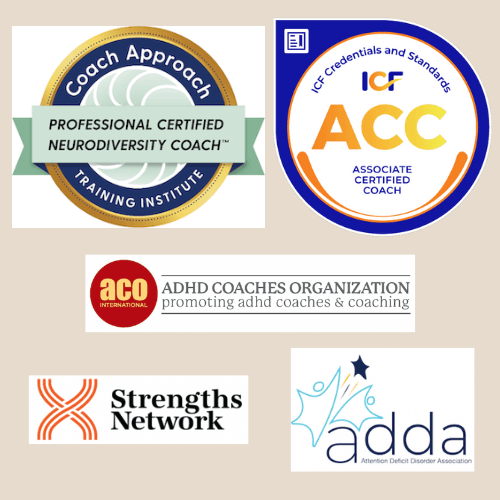Self-prioritisation is the first step to thriving with ADHD
One of the best ways we can reliably thrive in the world with our ADHD is to take leadership (or ownership) of our own wellbeing. And it starts with self-prioritisation. Self-prioritisation is a dealmaker for us.
While we hyperfocus on the next thing that catches our attention, or the most urgent task in front of us, our attention actually needs to be given to caring for ourselves and creating the conditions for us to thrive before we can be of value and service in the work that we do. This is particularly important for those of us in leadership and roles of influence and management.
The fundamentals for managing ourselves can sometimes seem less than easy - especially with a focus on others, our work, our businesses, our home life. And because a lack of consistency is a defining feature of ADHD, tending to the most critical components of self-prioritisation (the first rung of the ADHD self-leadership pyramid), can be neglected, overlooked, or pushed aside for more urgent tasks.
But they are key, and they are the building blocks to living life in our full ADHD colour with success.
So let's break down what we have here.
1. THE BASICS/DEALMAKERS
Eating regularly - helps regulate our blood sugar levels so we can better "self regulate" our responses and our emotions. When we're hyperfocused, the most basic body requirement of eating can be neglected. Yes we may complete a task at extraordinary speed and level of accomplishment, but we can also set ourselves up for dehydration, low blood sugar levels, migraines and so forth if we're not re-fuelling our tank.
Hydration - lack of water can result in headaches, constipation, mental fog, the list goes on. Replenishing ourselves with H20 helps everything work better so we can work better.
Exercise - often our nemesis, especially as we can struggle to activate for non-interest based tasks. And yet exercise is one of the best ways we can set ourselves up for success. Exercise creates and releases critical neurochemicals that help make our brains work better. And because ADHD is a deficiency in dopamine, when we can naturally enhance the creation and uptake of dopamine with exercise, we're able to cope better all round. Some ADHD experts claim that exercise alone can be enough to combat symptoms of ADHD in some people.
Sleep - a sleep deficit directly impacts the quality of our thinking, memory recall, concentration, and emotional resilience. Prioritising a minimum of 6 hours sleep is crucial for optimal functioning.
Medication - the benefits of medication to assist with ADHD symptoms is well known. Medication is one of the fundamental structural supports for many of us with ADHD.
Community - being in connection with others who live with ADHD is an important part of our mental health. It reduces the stigma as we realise we are not alone, there are many people with ADHD who are overcoming their challenges, who are thriving in their zones of interest and talent. One of the most helpful things we can do for ourselves is to connect with others living with ADHD.
2. SKILLS TO DEVELOP
Awareness of your ADHD template - this is the priority in this next level of ADHD self-leadership. Being aware of how ADHD shows up in you. There are many common behaviours that we share with others, but our ADHD is also unique for us - there is no one else with our family background, life experiences, talents, strengths, skills and interest areas. We are a one-off. So how does your ADHD play out for you? How do your own traits of ADHD hold you back? It's critical to get clear on your ADHD template.
Emotional observation & regulation - one of ADHD's characteristics is extreme emotions. Becoming aware of our responses and growing the skill of regulating them is critical in being able to thrive at work and at home.
Self-coaching - How can you most effectively help yourself? I'm a huge proponent of self sufficiency and resilience. Self-coaching is about employing strategies so you can manage your ADHD moment to moment. Some self-coaching tools are breathwork, observing feelings before reacting, writing to process strong emotions, knowing when to take time out, knowing what interventions work best for you (example, exercise first thing in the morning). You are the one who is with you the entire 24 hour period. You are your best coach when you can learn how to harness this skill.
Managing self in relationships - this is the skill of being able to moderate and modulate your self in your communication with others to foster positive, healthy dynamics of goodwill and trust - whether that be clients, colleagues, partner or family. Often our reactivity or black and white thinking can colour our relationships.
3. GUIDANCE & SUPPORT
A friend quizzed me on the potential conflict of a 'self leadership' model that includes seeking help. This highlights a myth that leadership is about being the sole voice, calling the shots, doing things yourself. The best leaders know what they need, what for, and when.
ADHD coaching - coaching is a unique and powerful partnership to help people maximize their potential not despite of their ADHD but because of it. "The process of coaching unlocks previously untapped sources of imagination, productivity and leadership" (ICF). ADHD coaching is just this, but in the context of a client's ADHD. Because task activation, inconsistency, poor time management and emotional dysregulation are core features of ADHD, working with a coaching professional who not only understands the challenges - but also strengths of ADHD - is an effective way to overcome your obstacles and thrive. Not dissimilar to therapy and not meant to replace it, one of the defining features of ADHD coaching is goal achievement and professional development.
Therapy - cognitive behavioural therapy (CBT) helps uncover your thought processes and challenge irrational or unhelpful thinking that may prevent you from moving forward and keep you stuck. It helps with managing everyday ADHD behaviours that impact daily life.
Accountability - adults with ADHD need structure and accountability to get things done. No one quite knows the science behind this, but it's likely because of the dopamine deficiency that unless there's an external 'locus of control' for the ADHD individual, routine but important tasks just don't get done. There has been a surge in accountability/co-working groups with productivity apps like Focusmate developed to support people to get important but uninteresting tasks done. Accountability is also a feature of ADHD coaching, there are accountability services for people with ADHD, but it can also be as simple as an agreement with a colleague or friend.


